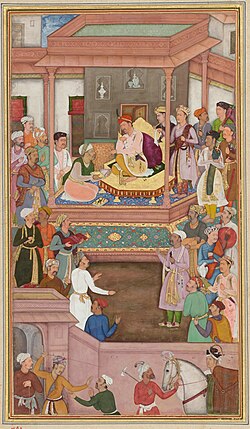Fathullah Shirazi

Sayyed Mīr Fathullāh Shīrāzī Namazi (Persian: سید میر فتح الله شیرازی; died 15 August 1589[1]) was a Persian Sufi polymath—an Islamic jurist, mechanical engineer, mathematician, astronomer, physician and philosopher—who worked for Akbar, ruler of the Mughal Empire. Shirazi was given the title of 'Azuddudaulah, translated as "the arm of the empire."[2] Shirazi was one of the students of the philosopher Ghyath al-Din Mansur Dashtaki. Eventually Shirazi left his native home of Safavid Persia to serve at the Mughal court.
Biography[]
Fathullah Shirazi Namazi was a polymath who worked as an imperial finance minister for Akbar. According to Abu'l-Fazl ibn Mubarak's Akbarnama, when Shirazi died, Akbar mourned his death:[3]
[Akbar] grieved at the departure of this memorial of former sages. He often said that the Mir was his vakil, Indian philosophy, physician, and astronomer, and that no one could understand the amount of his grief for him. "Had he fallen into the hands of the Franks, and they had demanded all my treasures in exchange for him, I should gladly have entered into such a profitable traffic, and have bought that precious jewel cheap."
Inventions[]
Among the inventions credited to him was an early anti-infantry volley gun with multiple gun barrels similar to a hand cannon's.[4]
Another cannon-related machine he created could clean sixteen gun barrels simultaneously, and was operated by a cow.[2] He also developed a seventeen-barrelled cannon fired with a matchlock.[5]
Not all of his creations were intended for warfare however; he designed a carriage praised by Abu'l-Fazl ibn Mubarak for its comfort. It could also be used to grind corn when not transporting passengers.[2]
Bengali land taxes were initially collected according to the Hijri calendar which did not coincide with the solar agricultural cycles. In response, emperor Akbar asked Shirazi to create a new calendar by combining the Hijri and the native calendars. Referred to as the fôshôlī shôn (harvest calendar), Shirazi is credited as the formulator of the modern Bengali calendar.[6][7]
He invented the gaj-i-ilahi system.[4][3][8]
Notes[]
- ^ Sharif Husain Qasemi (1999), "Mīr Sayyed Fatḥ-Allāh Šīrāzī", Encyclopaedia Iranica.
- ^ a b c Friedrich Christian Charles August; Gustav von Buchwald (1890), The Emperor Akbar, Trübner, p. 116
- ^ a b Richards, John F. (1987), The Mughal Empire, Cambridge University Press, p. 69, ISBN 0-521-56603-7
- ^ a b Bag, A. K. (2005), Fathullah Shirazi: Cannon, Multi-barrel Gun and Yarghu, Indian Journal of History of Science, pp. 431–436.
- ^ Clarence-Smith, William Gervase, Science and technology in early modern Islam, c.1450-c.1850 (PDF), Global Economic History Network, London School of Economics, p. 7
- ^ Kunal Chakrabarti; Shubhra Chakrabarti (2013). Historical Dictionary of the Bengalis. Scarecrow. pp. 114–115. ISBN 978-0-8108-8024-5.
- ^ Mohanta, Sambaru Chandra (2012). "Pahela Baishakh". In Islam, Sirajul; Miah, Sajahan; Khanam, Mahfuza; Ahmed, Sabbir (eds.). Banglapedia: the National Encyclopedia of Bangladesh (Online ed.). Dhaka, Bangladesh: Banglapedia Trust, Asiatic Society of Bangladesh. ISBN 984-32-0576-6. OCLC 52727562. Retrieved 7 February 2022.
- ^ Clarence-Smith, William Gervase, Science and technology in early modern Islam, c.1450-c.1850 (PDF), Global Economic History Network, London School of Economics, p. 25
- 1589 deaths
- 16th-century Indian inventors
- Firearm designers
- Indian Muslims
- Iranian Muslims
- Iranian inventors
- Iranian philosophers
- Islamic philosophers
- People from Shiraz